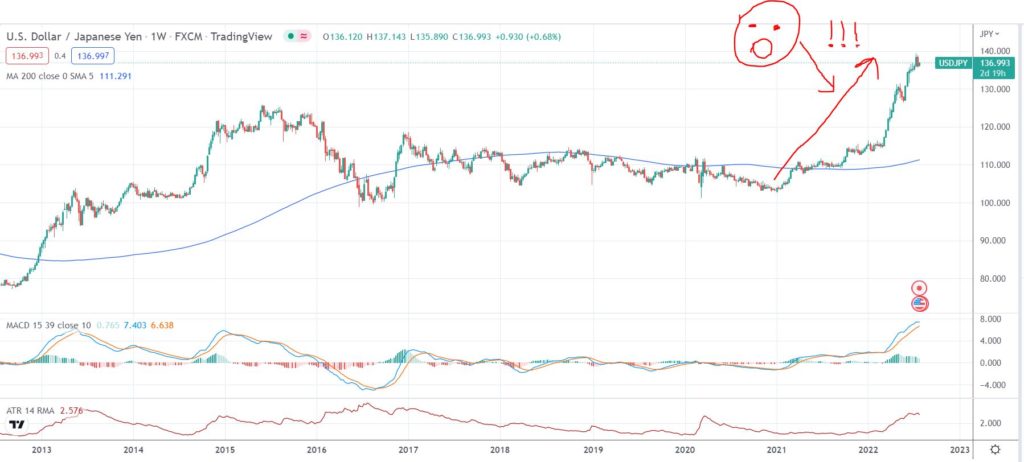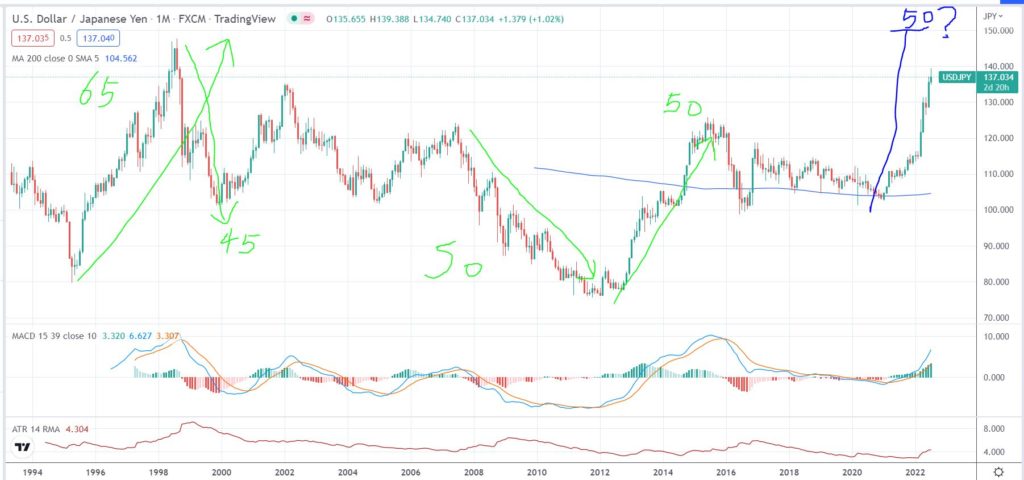
Something’s been happening in the currencies market. Of course I’m talking about USDJPY rocketing to the moon over the past 10 months or so. Why is it happening you might ask? And more importantly, how can one possibly profit from such a move? Well, let me break it down for you.
First, my background on currencies. I’ve been following the currencies market for a long time. It started in college. At 19, I wanted to open up a brokerage account to trade. Of course when you are 19, what better ways to fund your trading account than to use your student loans supposedly for your tuitions? So I had kept some money aside and looked to open up a brokerage account. There were only two choices for me at the time. Open up a stock trading account or a discount FX trading account. The minimum deposit on the stock trading account was about $5k. For FX account, it was like $50. I didn’t have $5,000, so by process of elimination, I “chose” to open up an FX trading account.

This was my foray to capital markets and trading. And FX was the first market I ever traded. This is also why this site is also about global macro, because I still follow currencies.
So why has the Japanese Yen weakened against the greenback? Divergent central bank policies. Since I started following the market back in the days, there was a time (pre-2009) when interest rates of different countries/economies were left with more freedom to roam according to economic conditions – like kids back in the days were allowed to wonder two blocks beyond the house and the parents didn’t care. That changed after the financial crisis of 2008. Now every quarter, sometimes every month, we worry about what central banks would do with interest rates. The US Federal Reserve, as well as central banks of all other countries, keeps a very close grip on short term interest rates.
The higher a country sets its overnight rate (1 day borrowing rate for interbank lending), the greater amount of money would flock to that country’s currency, because people would take advantage of the higher interest rate offered by that country’s currency.
Over the past 6 months, the US has been on an interest rate hiking crazy. As inflation breaches 8% and then 9%, the US fed has scrambling to raise interest rate to cool off the economy and slow down inflation. It’s working alright. Conditions seem to be tighter already and the bond market is pricing in recession. Undaunted, the US fed continues to tout a hawkish stance on raising the rates.
The Japanese economy has been on totally a different page. Inflation remains tepid. There are still more adult diapers than kids. Interest rate is still negative. At a time when all major economies are raising rates to keep up pace with the US rate hikes, Japan standing stout and proud is the only country that said “nah, I’m good man.” Without a overheating, or even an economy that’s barely warming up, Japan remains steadfast in keeping interest rate low, to stimulate their economy. (I don’t think it’s going to work. But that’s perhaps for another article). The dovish stance by BOJ has eviscerated the Yen, which as a result of the divergence of policies from FED and BOJ has lost 20% of its value over the past year. The Yen literally has fallen the double of SPX.
The US fed will announce how much they will hike tomorrow Jul 27, 2022. It’s probably going to be 75 bps, taking US rates up to 2.35%. Japan is staying put at -0.1%. What this means is that the interest rate disparity will persist… Naturally, the question is how much further would the Yen fall against the dollar? I think another 10%. Simply out of historical price patterns. When USDJPY moves, the large macro, multi-months moves over the past 30 years are in the magnitude of 50 JPY per USD.

Of course trend could also take a 180 because Japan wants to raise rates (very unlikely), or the Fed unexpectedly really ease off the pedal on the rate hikes (more probable than BOJ hiking, but still ain’t very likely). It’s also about the formidability of each country’s economy. G10 excl. Japan is all hiking. But rate hikes dampens economic activities and cools growth, so the acts of hiking is also about whose economy is most resilient against hikes. The less formidable one’s economy is against the hikes, the sooner it taps out of the rate hike game. No doubt to me that USA economy is probably the most tolerant of rate hikes in all the major economies, so I’d expect the fed to stay ahead of the pack when it comes to the rate hikes.
So, I’m still long USDJPY, until probably 150 or until Japan feels uneasy about how low its currency has dipped, or until the fed finds dollar at an undesirably expensive level. We are not there yet, so I’m still straddling the USDJPY rocket to the moon, and make that 19 year old kid a good return on his college tuition expense



What’s happened to the Japanese Yen
Leave comments guys!